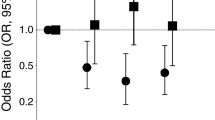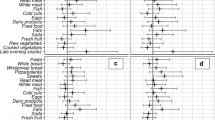A hospital-based, multicenter, case-control study has been performed in Poland covering 741 incident stomach-cancer cases (520 males and 221 females) and the same number of controls. All stomach-cancer diagnoses were evaluated for histologic type according to the Lauren criteria. Fifty-one percent were of the intestinal type, 35 percent of the diffuse type, and 8.5 percent of the mixed type. The frequency of consumption of individual food items and several food groups was analyzed and the association of various foods with stomach cancer risk was evaluated after controlling for sex, age, occupation, education, and residency. Increased consumption of sausages was related significantly to gastric cancer risk, whereas increased consumption of cheese products, nonwhite bread, vegetables, and fruit was associated with decreased risk. A particularly strong decrease in risk was associated with consumption of radishes and onions. When consumption of fruits and vegetables, sausages, nonwhite bread, and cheese were introduced simultaneously in a multivariate model, independent effects were found only for fruit and vegetables, sausages, and nonwhite bread. The use of table salt, the frequency of eating hot meals, and an irregular eating pattern were also associated with increased risk, while additional consumption of fruit between meals showed reduced risk. If a reduction in vegetable and fruit consumption took place after marriage, an increased risk for stomach cancer was found, whereas augmented consumption of these food items after marriage decreased the risk. Separate risk models were calculated for stomach cancer of the intestinal and diffuse types, but both histologic varieties showed the same pattern of associations with dietary risk factors.
Similar content being viewed by others
References
Boeing H. Epidemiological research in stomach cancer: progress over the last ten years J Cancer Res Clin Oncol 1991; 117: 133–43.
Lauren P. The two histological main types of gastric carcinoma: diffuse and so-called intestinal type carcinoma. Acta Path Microbiol Scand 1965; 64: 31–49.
Munoz N. Descriptive epidemiology of stomach cancer. In: Reed PI, Hill MY, eds. Gastric Carcinogenesis. In: Experta Medica International Congress 1988; Series 795: 51–69.
Jedrychowski W, Wahrendorf J, Popiela T, Rachtan J. A case-control study of dietary factors and stomach-cancer risk in Poland. Int J Cancer 1986; 37: 837–42.
Breslow NE, Day NE. Statistical Methods in Cancer Research. Vol 1. The Analysis of Case-control Studies. Lyon: International Agency for Research on Cancer, 1980; IARC Pub. No. 32.
Mirvish SS. Effects of vitamin C and E on N-nitroso compound formation, carcinogenesis, and cancer. Cancer 1986; 58: 1842–50.
Belman S. Onion and garlic oils inhibit tumor promotion. Carcinogenesis 1983; 4: 1063–5.
Sparnius VL, Mott AW, Barany G, Wattenberg LW. Effects of allyl methyl trisulfide on glutathione S-transferase activity and BR-induced neoplasia in the mouse. Nutr Cancer 1986; 8: 211–5.
Block E. The chemistry of garlic and onions. Scientific American 1985; 252: 94–9.
Wattenberg LW. Inhibitory effects of benzyl isothiocyonate administered shortly before diethylnitrosamine or benzo (a) pyrene on pulmonary and forestomach neoplasia in A/J mice. Carcinogenesis 1987; 8: 1971–3.
Haenszel W, Kurihara M, Segi M, and Lee RKC. Stomach cancer among Japanese in Hawaii. JNCI 1972; 49: 969–88.
Trichopoulos D, Ouranos G, Bay NE, et al. Diet and cancer of the stomach: a case-control study in Greece. Int J Cancer 1985; 36: 291–7.
Nomura A, Grove JS, Stemmermann GN, Severson RK. A prospective study of stomach cancer and its relation to diet, cigarettes, and alcohol consumption. Cancer Res 1990; 50: 627–31.
Buiatti E, Palli D, Decarli A, et al. Case-control study of gastric cancer and diet in Italy. Int J Cancer 1989; 44: 611–6.
You WC, Blot WJ, Chang YS, et al. Diet and high risk of stomach cancer in Shandong, China. China Res 1988; 48: 3518–23.
Graham S, Hanghey B, Marshall J, et al. Diet in epidemiology of gastric cancer. Nutr Cancer 1990; 13: 19–34.
Boeing H, Frentzel-Beyme R, Berger M, et al. Case-control study on stomach cancer in Germany. Int J Cancer 1991; 47: 858–64.
Kodama M, Kodama T, Suzuki H, Kondo K. Effect of rice and salty rice diets on the structure of mouse stomach. Nutr Cancer 1984; 6: 135–47.
La Vecchia C, Negri E, D'Avanzo B, Franceschi S. Food temperature and gastric cancer risk. Int J Cancer 1990; 46: 432–3.
Kato I, Tominaga S, Ito Y, et al. A comparative case-control analysis of stomach cancer and atrophic gastritis. Cancer Res 1990; 50: 6559–64.
Additional information
Drs Boeing and Wahrendorf are at the German Cancer Research Center, Institute of Epidemiology and Biometry, Im Neuenheimer Feld 280, D-6900 Heidelberg, Germany. Drs Jedrychowski and Tobiasz-Adamczyk are in the Department of Epidemiology, Institute of Social Medicine, Medical School in Cracow, Poland. Drs Popiela and Kulig are at the Surgical Clinic, Medical School in Cracow, Poland. Address correspondence to Dr Boeing. The field study was supported by a grant from the Polish Cancer Research Program coordinated by Prof. Dr Tadusz Popiela. The analysis of the data was supported by the German Cancer Research Center.
Rights and permissions
About this article
Cite this article
Boeing, H., Jedrychowski, W., Wahrendorf, J. et al. Dietary risk factors in intestinal and diffuse types of stomach cancer: a multicenter case-control study in Poland. Cancer Causes Control 2, 227–233 (1991). https://doi.org/10.1007/BF00052138
Received:
Accepted:
Issue Date:
DOI: https://doi.org/10.1007/BF00052138




